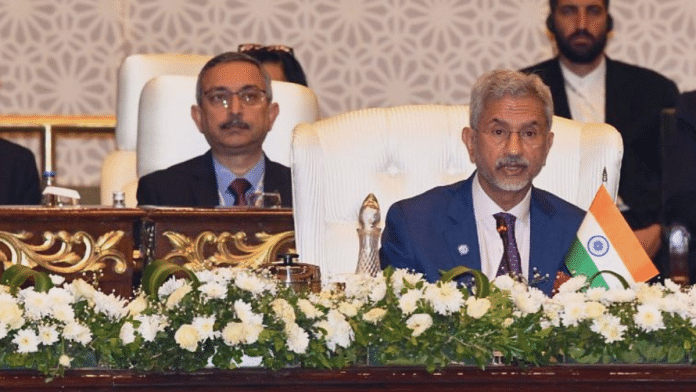This month, Pakistan has had two Indian visitors: Zakir Naik and S Jaishankar. While the reason behind Naik’s invite remains a mystery, Jaishankar’s visit has ended before it could become blistery. He came, he wore his aviators, he left.
What didn’t leave with the Indian external affairs minister is the hope hype around the India-Pakistan dialogue all over again.
Leading the pack is three-time former Prime Minister Nawaz Sharif, who in a statement wished Indian Prime Minister Narendra Modi had also come to Pakistan for the Shanghai Cooperation Organisation (SCO) summit. Consider us hopeless siyasi (political) romantics.
No love, just vibes
With thanks all around and no India-Pakistan spat to report at this SCO, this summit was a resounding success. Of course, there were the usual buzzwords, “cross border”, “terrorism”, “separatism”, and “extremism”, and how these activities hamper trade, connectivity, and people-to-people exchanges—a veiled cautionary tale from Jaishankar. But in a parallel universe, cross-border and within-the-border television reporters were too busy analysing the five to seven minutes Jaishankar spent with foreign minister Ishaq Dar at the dinner table. “Yeh sirf chit chat nahin hai (this is not just informal chit chat),” we are told—there is more to that dining table talk.
Thank god for the “sources” who also confirmed that Jaishankar was seen in the lounge with Prime Minister Shehbaz Sharif. And when it comes to sources, seeing is believing what is not even seen. Next was speculation on the Indian cricket team coming to Pakistan for the 2025 ICC Champions Trophy. What next? Jaishankar shifts to Pakistan and we all live happily ever after. No, that’s still too soon. Let us wait for the next time we find Indian and Pakistani prime ministers in the hallways or the dining halls of another summit.
Also read: R&AW must answer why it tolerates poor tradecraft, recruitment standards, officer oversight
Sharif’s unforgivable India dosti
That next chance could be the COP Climate Change Summit next month—at least Sharif hopes that Modi and Shehbaz meet in Baku, Azerbaijan. In his interactions with the Indian journalists post-SCO, Sharif urged that both countries should “not waste 75 more years like we have wasted the past 75. Both sides should sit and talk seriously.”
Staying on summits, this February marked the 25th anniversary of the Lahore Declaration, a historic treaty signed by then-prime ministers Atal Bihari Vajpayee and Nawaz Sharif. It gave a bilateral future framework for addressing the longstanding issues between India and Pakistan. Upended by General Pervez Musharraf’s Kargil War, we will never know what it could have been. A war that was once said to have been waged by Hizbul Mujahideen alone, with no involvement of Pakistan Army. Now, the army chief acknowledges Pakistani soldiers who died in the war. Sharif talks about how Kargil was a violation of the Lahore Declaration by Pakistan.
It is positions such as this that have, in the not-so-distant past, put Sharif in the bad books of Pakistan Army. What has also remained consistent in the last 25 years is the military establishment’s anger with Sharif over his India dosti (friendship) and especially the Modi ki yaari (friendship with Modi). If a politician in Pakistan seeks a healthier relationship with India, it is only considered treachery. If a dictator in uniform talks of the same while posing in front of the Taj Mahal, however, it is seen as the highest form of patriotism.
Also read: Is Five Eyes destabilising India’s rise as non-white power? Idea is as old as Cold War era
History can’t be repeated
Sharif blamed former Prime Minister Imran Khan’s language for tanking Pakistan’s relationship with India. However, that language didn’t just hamper relations with India—even the Saudi crown prince was literally abused by Khan in cabinet meetings.
The environment post-Pulawama attack, Balakot airstrikes, and the abrogation of Article 370 made anti-India rhetoric the Pakistan government’s lone policy. Calling Modi a “small” man, a “fascist”, “Hitler” and discussing his chest size became a doctor-prescribed pill for Khan, to be taken four times a day. Not to forget, the Pakistan PM’s Twitter display photo going black on India’s Independence Day or his call to the citizens, asking them to stand in the sun for 30 minutes to free Kashmir.
Later, when the time came to restart the India-Pakistan dialogue, it was this very rhetoric that gave Khan cold feet. After lifting the ban on the import of sugar and cotton from India, the decision was backtracked within hours. The back-channel diplomacy that continued with the UAE’s backing aimed at making Khan and Modi meet, a 20-year moratorium on the Kashmir dispute, and efforts to revive trade and cultural ties, all went down the drain because the Pakistan government thought it was too big a price to pay politically at home. It was seen as similar to the “Kashmir baich diya (sold Kashmir)” rhetoric, which had become a political itch that won’t leave.
According to former Army Chief General Qamar Javed Bajwa, the Indian PM was set to visit Pakistan in April 2021. Modi’s pilgrimage to the Hinglaj Mata Mandir in Balochistan, followed by a meeting with Khan and signing a peace deal was on the cards. And then it wasn’t. Sharifs have faced challenges from the military establishment whenever they’ve tried to smoothen relations with India. But here was a PM in Khan who had the full support of the army to move to a peace deal but didn’t have the vision or capacity to think beyond himself.
Hoping that the past is not the future, for now, let’s find solace in knowing that Pakistan is not India’s least favourite country at the moment—thanks to Justin Trudeau.
Naila Inayat is a journalist from Pakistan. Her X handle is @nailainayat. Views are personal.
(Edited by Prasanna Bachchhav)



